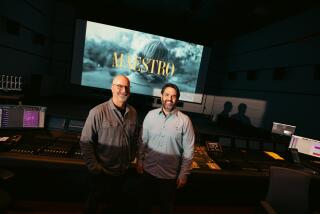They shoot, he scores (and snips)
- Share via
Hollywood is full of hyphenates: writer-directors, director-producers, even director-composers. But, as far as we can tell, John Ottman is the town’s only composer-editor. He has functioned as both film editor and score composer on four of director Bryan Singer’s five movies, winning the British version of the Academy Award for editing 1995’s “The Usual Suspects.” His latest dual effort is on Singer’s “X2: X-Men United,” which opened last week.
Ottman spent 10 months on the film, editing it on location in Vancouver and here in L.A., then composing the 106-minute score and recording it in March and early April with a 98-piece orchestra and 44-voice choir.
Since launching his dual career with Singer’s “Public Access” a decade ago, Ottman, 38, has also scored “The Cable Guy” (1996), Singer’s “Apt Pupil” (1998), “Lake Placid” (1999), “Eight Legged Freaks” (2002) and a dozen other films. He also directed, edited and scored “Urban Legends: Final Cut” (2000).
Why didn’t you work on Singer’s previous film, the first “X-Men” (2000)?
Because I was off changing the world with my teen horror masterpiece, “Urban Legends II.” It wasn’t supposed to work out that way. “X-Men” was supposed to be released at Christmas. If we had known there would be a collision course, I never would have done “Urban Legends.” I wasn’t going to edit, so there was plenty of time [to score]. But when they accelerated to a summer release, there was about a three-week overlap, so it was impossible. If we had finished just a few weeks earlier, I could have done it.
For the sequel, though, Singer engaged you as both editor and composer.
He wouldn’t hire me as a composer unless I edited the movie. I put up a fight, but he really wanted me to do both jobs.
How does editing a film help you as the composer?
The advantage is, of course, you know the film more intimately than any composer being hired on a project ever could. An editor is a problem solver, so a lot of that rubs off on my composing. Every film has some sort of problem area. It’s the challenge I look forward to on any movie, even if I’m just the composer. I find a way to home in on my filmmaking instincts and solve the problem musically. Music is the last great hope of a film, and when all other attempts have been exhausted, you’re the only guy left who can -- maybe -- do something about it.
What does the music have to accomplish in “X2”?
As with any film, the score has to provide the soul of the movie and bring out the emotions beyond a surface level. The style of the score is traditional, rooted in character themes, which is why it was such a fun score to write. The romantic notion of film scoring is, to me, withering on the vine a little bit. I would love to keep that alive.
In terms of craftsmanship, which is more rewarding, editing or scoring?
Oh, music, by far. For one thing, you can take it away from the movie and say, “Look, Mom, here’s my work.” With editing, the only people that really know what miracles you pulled off, aside from someone who may have a real sixth sense watching a movie, are the director and producers. It’s a very nebulous contribution.
More to Read
Only good movies
Get the Indie Focus newsletter, Mark Olsen's weekly guide to the world of cinema.
You may occasionally receive promotional content from the Los Angeles Times.







